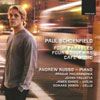Schoenfield (4) Parables; (4) Souvenirs
Musical nods in myriad directions transformed into a glorious ‘fake’
View record and artist detailsRecord and Artist Details
Composer or Director: Paul Schoenfield
Label: Black Box
Magazine Review Date: 12/2007
Media Format: CD or Download
Media Runtime: 54
Mastering:
Stereo
DDD
Catalogue Number: BBM1109

Tracks:
| Composition | Artist Credit |
|---|---|
| Concerto for Piano and Orchestra, `Four Parables' |
Paul Schoenfield, Composer
Andrew Russo, Piano JoAnn Falletta, Conductor Paul Schoenfield, Composer Prague Philharmonia |
| (4) Souvenirs |
Paul Schoenfield, Composer
Andrew Russo, Piano James Ehnes, Violin Paul Schoenfield, Composer |
| Cafe Music |
Paul Schoenfield, Composer
Andrew Russo, Piano Edward Arron, Cello James Ehnes, Violin Paul Schoenfield, Composer |
Author: Philip_Clark
If you turned the radio dials and stumbled across Paul Schoenfield’s Four Parables, written in 1983, it would be perfectly reasonable to assume the work originated in 1920s New York. Out of a mournful opening, Schoenfield jams his solo pianist into a propulsive Swing Era groove, complete with big-band brass swagger and a drum-kit part that Gene Krupa could have called his own. But listen more carefully and Schoenfield lets slip that he’s drawing on a source rather than writing historically authentic music. Chromatic Gershwinisms reach a tipping-point from where they tumble into Thelonious Monk-like clusters. Shaking brass chords leap forward three decades to suggest West Side Story or the Dizzy Gillespie big-band. The third-movement “Elegy” collages gospel tunes and deploys string glissandi as a nod towards Charles Ives’s activities during the Jazz Age. This is a superior “genuine fake” – rigorously assembled from its constituent parts and transformed via Schoenfield’s idiosyncratic imagination. Andrew Russo’s muscular pianism and the Prague Philharmonic’s evocative playing help clinch the illusion.
Essentially Schoenfield is building on top of existing structures to reveal simple truths. His Four Souvenirs (1989) features archetypal dance forms. A “Tango” sounds like it’s rebounding out of the way-back standard “Brother, can you spare a dime”, while a “Square Dance” is yee-hah authentic. The piano trio Café Music pitches itself between “high-class dinner music” and “concert-hall music”, a cogent acknowledgement of the hinterland between art and entertainment where so much American music has been obliged to sit. In Schoenfield’s hands, it’s art for sure.
Essentially Schoenfield is building on top of existing structures to reveal simple truths. His Four Souvenirs (1989) features archetypal dance forms. A “Tango” sounds like it’s rebounding out of the way-back standard “Brother, can you spare a dime”, while a “Square Dance” is yee-hah authentic. The piano trio Café Music pitches itself between “high-class dinner music” and “concert-hall music”, a cogent acknowledgement of the hinterland between art and entertainment where so much American music has been obliged to sit. In Schoenfield’s hands, it’s art for sure.
Discover the world's largest classical music catalogue with Presto Music.

Gramophone Digital Club
- Digital Edition
- Digital Archive
- Reviews Database
- Full website access
From £8.75 / month
Subscribe
Gramophone Full Club
- Print Edition
- Digital Edition
- Digital Archive
- Reviews Database
- Full website access
From £11.00 / month
Subscribe
If you are a library, university or other organisation that would be interested in an institutional subscription to Gramophone please click here for further information.




